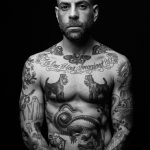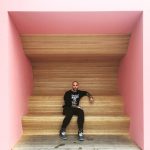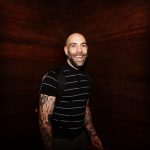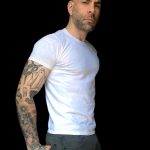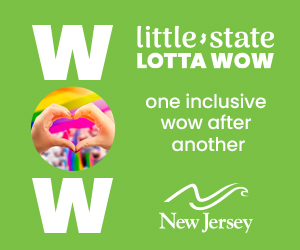Noah Michelson: Sex, Love, Tattoos and Queer Voices
It was a total honor to be able to speak with one of the community’s most poignant, flawless and outspoken writers of today, Noah Michelson, editor of Queer Voices on Huffington Post. And did I mention he’s sexy? When someone starts an interview with a statement like “Whatever you have, I’m ready for it,” you just know it’s going to be a smooth and enlightening conversation.
Having noticed him as a guest on Logo’s “Cocktails and Classics,” and having explored many of his writings, I decided it was time to discover what he was about. Michelson not only came with a heartfelt story about his childhood, his beginnings as a poet and then as an intern at “Out” magazine having never written a single article in his life, he also shared some magical advice about bullying, writing, sex and tattoos.
I read that you started your career as a poet. Is that true?
That is true. I went to grad school at NYU for poetry, and then I graduated and suddenly realized I had thousands of dollars of debt, and you don’t make any money as a poet. So maybe it wasn’t the smartest plan, but I was really following my heart, and poetry is still really important to me. I had a family that really supported that, and I thought, “We’ll see what happens.” It didn’t really work out.
So you became an editor for Queer Voices at Huffington Post instead.
I was 29 years old, and I had no idea what I was going to do with my life. I got an unpaid internship at “Out” magazine, and I just started working there. All the other interns were 18 or 19 years old, and here I was, grandpa, but I knew that I wanted to do this. After the first couple of weeks, I loved it. I had really great mentors, and they taught me everything. I had never written an article in my life. I had no background in journalism, and I knew I wanted to do it. I worked really hard, and had really great mentors, and that’s how it happened really.
That’s a little amazing.
I think so too. I always tell people when they come and ask me how do you do it, I always say, “When somebody gives you something to write, you write everything, even if you don’t care about it, or don’t know anything about it, and you get better. It’s a muscle.” The first year I was an intern I wrote four stories a day, and they were awful, but by the end of the year I got better and better. Now, 10 years later, I think I’m pretty decent at it.
I agree with you. I know I write anything that’s handed to me.
You learn something from it. You get something out of it.
Absolutely, and it always leads somewhere else.Speaking of somewhere else, I want to know more about that sexy podcast that you do.
We’ve been doing it for a year and a half, and actually we are looking to do something different with it. We might move it onto Facebook Live, or we might be doing more of a serial kind of thing.But I’m into things relating to sex and love, and I think that people don’t talk about it in a nuanced or smart way enough in this country. People are obsessed with it, but we also don’t talk about it honestly, or openly, or in a smart way. So that’s what we really wanted to do, my co-host Carina Kolodny and I. We want to look at it from an anthropological perspective, calling on experts to weigh in on things. It’s been a lot of fun. What I have learned the most from it is that no one feels like they are normal when it comes to sex. We get all these questions from people saying “I like this” or “I want to do this; am I normal?” You know what, everybody is normal, because nothing is normal. It’s been really eye-opening to get all these things like the future of sex, having sex with robots, to people who have fetishes for adult diapers. I personally don’t know anything about it, and I’m not interested, but I learned so much.
I guess talking about sex is still a little taboo around town.
100%. Also, to be able to talk about this kind of stuff so openly on a site like Huffington Post, which has so many people reading it, is also very thrilling to me. There are a lot of people writing about sex on blogs and things like that, but a lot of times it doesn’t get that kind of exposure that I can give it because of the platform I have. That’s very exciting to me.
Can we talk about your tattoos?
Of course. I started when I was 32, so I was very late, because my parents were so dead set against it. I grew up in Wisconsin in a small town, and to them and a lot of people in my town, tattoos were kind of the bad seeds. They equated having tattoos with not being successful, and it’s only been recently that you can get a job when you’re heavily tattooed and it not being issue. My dad passed away when I was 31, so I explained to my mom that I always wanted tattoos, I pay my own rent, I’m a grown-up now and I’m going to do this. What changed her mind is I got her name tattooed on my wrist. I’m about 80% covered now, so every time I get a new one she’ll say, “You’re done now, right?” I’ll say, “Mom, I’m not done yet,” and then she’ll finally admit that she thinks that they’re pretty. Objectively she thinks that they’re pretty, but I’ll always be her little boy, and it’s a little hard for her to see them on me. I think that they change the way people look at you. People think that I’m tougher than I am. I think people think I’m meaner than I am, so it’s an interesting thing to become a heavily tattooed person. It’s interesting to watch the way that people react to you in the world. It’s kind of an eye-opening experience.
I think they are really sexy.
Thank you; I do too. You know, there is kind of a queer component to it too. I’ve spent so much of my life hiding parts of myself. Hiding stories about myself. When I had the chance to start telling my stories, and putting some of the stories on to my body, it was a relief. I was finally able to get things off my chest by putting things on to my chest. A lot of that had to do with my queerness. I feel like it represents who I am. It’s a different way to express yourself.
It must have been hard growing up in a small town in Wisconsin and being gay.
I can’t even tell you. It was very hard in the ‘80s in southern Wisconsin. I didn’t know anyone that was gay. I didn’t even know Boy George was gay. I grew up as a very, very, very gay boy. The first part of my life I wanted to be a girl. All the things that I liked were girl things. I was very boy crazy, and it made sense that if you were a guy, you were supposed like girls. To my parents’ credit, they always supported me. They bought me a Cabbage Patch kid, they bought me My Little Pony, and I don’t think I would’ve survived without them. School was torture. The kids were awful.
Were you the only gay person in the town?
No, but I just didn’t know who they were. The rumor was that the one gay bar had a closed-circuit TV where they could watch the parking lot to see who was getting gay bashed. So it was rough. I knew I had to get out as soon as I could. I went to Minneapolis for college. It wasn’t far away, but at least it was a metropolis. I knew from there that I was going to get to New York at some point.
Having said all of that, and looking back, what advice would you have given baby Noah?
As much as I really appreciate things like “It gets better,” I don’t think that that’s very helpful for kids. When you are smack in the middle of being tortured, and you know you have at least three years before you can get out of there, hearing it will get better someday really doesn’t help. When kids ask me that—I actually have a show that I do every Wednesday now called “The Queer Frontier,” and 95% of the kids that listen are in their teens. They ask me for advice, and I give them advice. I never really did this before, but it’s very sweet, and I find it very fulfilling. I tell them, if you can find even one person to come out to, one person that you can be yourself with, I think that will help. I think kids now are luckier than I was—one, because we live in an environment now that’s easier for a lot of those kids to come out, and two, there’s a lot more culture for them. At least you are seeing yourself on TV, or a version of yourself. I tell the kids to find the musicians and the songs that make you feel more like a whole person. Watch the movies, read the books that are going to be important to you while you’re biding your time. I’m not going to tell them it’ll get better, or just wait, because they know they have to wait. I tell him to find the guidance counselor who is supportive, find friends you can come out to, and then find the culture.
I’ve found that some of the kids that come to me have a harder time coming out to their parents than society.
It’s funny, when I came out to my parents, my uncle was gay. He sort of paved the way. He passed away from AIDS in the ‘90s , so their first real intimate experience with queerness was also with AIDS. So when I came out, my parents already dealt with that, and they were very liberal. But my mom started crying. I asked her why she was crying, and she said, “Because all of my hopes and dreams have to change now.” She didn’t mean to be so dramatic in such a negative way, but it was 1996, and we still couldn’t get married, we still couldn’t adopt kids, so I think even for today in 2016, I think that they are scared for the kids, not wanting them to deal with some of the bullshit that you’re going to have to deal with. Luckily, more and more parents are starting to come around. It does give me some hope. I think I recently I heard the average age that kids are coming out now is 14. I was 19, and I can’t imagine coming out at 14. That is really hopeful to me.
So you’re a new addition to a crayon box. What color are you?
Wow, I’ve never been asked this before. That’s great! My color is black-eye blue.
If you could pick two celebrities to be your parents, who would you choose?
RuPaul—I’ve always worshipped RuPaul—and Kate Bush. RuPaul was probably the first queer person that I had ever seen, and I love Kate Bush. I think she’s brilliant.
If somebody told you that you couldn’t write anymore, what would you do to be creative?
Do you know what I really want to do? I’m trying to find a way to do it: My heart is really in music. I spend more time with my headphones on than probably any human being. I make up songs in my head, and I don’t know how to get them out, because I don’t understand music at all. So I would love to take music classes. I would like to take the class with maybe a five-year-old who is literally learning the very basics of music. I feel like that’s my level right now. So I think I would say music.
If you had a day off, and could do anything you wanted, and as much of it as you wanted, what would you do?
My ideal day off when I’m in New York City is, I get up early, and I go to the gym. It sounds boring, but that’s what I really love to do, and I like to get stoned and go for a really long walk around the city, listening to my Walkman. I do my best writing actually when I’m walking. Then I’d meet a friend for dinner, and then have sex. That’s a really good day to me.
Do you have a boyfriend?
I do not, but I’m recruiting. But here’s my thing. I once had my astrology chart read by someone who is very accurate. He said I had the same chart as most monks have. “What I mean by that,” he said, “is that you like people, but you don’t need people.” He said that I’m fine alone, and that I only want to be around people that I care about. That’s 100% true. So I don’t want to have a boyfriend just have a boyfriend. I want to have a boyfriend because he totally kicks ass and he challenges me. So I’m looking for a boyfriend, but I’m not desperate for a boyfriend.
We will have to list those qualifications then. As a journalist, what was your first reaction when Orlando happened?
I got a call from my national editors at 7:30 in the morning. They didn’t exactly know what was going on. I was heart sick. My second reaction was I was furious. That sort of lived in my head and my heart for the next month. It’s still there; I’m still heart sick. As queer people, I sometimes think we aren’t angry enough.
Any last words?
I’m just really honored and lucky to get to do the work I do, even though it’s hard, like with Orlando, and my heart is breaking, and I still have to be working and reporting and thinking about things.
HuffingtonPost.com/Queer-Voices

